- Home
- Vicki Delany
Whiteout Page 7
Whiteout Read online
Page 7
“Well, you must realize that the directors were quite upset at such a waste of their time. I tried my best to calm them, of course.” Of course, Joanna rolled her eyes at the ceiling. “It will be difficult to get them together again.”
She recognized the signs. If Fred wanted his ego stroked, she could be a champion stroker. “Oh, Fred. Please try, won’t you? I’m sure you can explain the situation to them so that they will understand. They’ll listen to you.”
“Well, you see, Joanna…Some of them don’t really know why you have gone to live up in…wherever it is you are. They are wondering how reliable your work for us will be.”
You’re wondering how you could trust someone who doesn’t want to be under your suffocating wing, Joanna thought. But into the phone she stroked some more. “I understand, Fred. But I know that you really believe that I am the right person to do this job. If you remind them of that, then they’ll understand.”
“Perhaps, let me see what I can set up and I’ll get back to you.”
“Bye Fred. My love to all there.”
Joanna suppressed a screech as she hung up the phone. Fred sounded suitably pacified. But it was just such a waste of effort. Of course she was the only person for the job.
Every muscle in her body screamed to stay in bed as she swung her legs to the floor. She made her way across the room and into the shower, taking great care not to jar anything tender. The stream of hot water worked magic as it always did and got at some of the aches, but not all. She was painfully lifting one leg to put on a slipper as the phone rang once more.
She considered letting the infernal machine ring away to its heart’s content. But, like any modern city dweller, she couldn’t resist the siren call, and stumbled to her desk for the receiver.
“Hello.”
“Is that Joanna Hastings?” It was a man’s voice, deep and slow. One she didn’t recognize.
“Speaking.”
“You don’t know me, but I was given your name by Maude Mitchell…”
“Yes?”
“Maude told me that you are quite a computer expert and I’m having a bit of a problem with mine. So I was wondering if you would be able to come over and have a look.”
This was unexpected. She had absolutely no interest in setting herself up as some sort of computer repairperson.
“Uh, are you there, Ms. Hastings?”
“Yes, I’m here. But really, I don’t know. I don’t do house calls. What have you got?”
“A Pentium, I think.”
“What level of Windows do you have?”
“Uh, Windows NT, I think. Would that be right?”
“Oh. Not many people have that on their home computers.”
“Well, my brother is in the computer business. He set it all up for me.”
“What’s the problem?”
“I just bought a new desktop publishing package. It’s the first thing I bought extra for the PC and I can’t get it to print.”
“Why don’t you call tech support. You must have been given a number. Somewhere in the software manual will be a number you can call.” Joanna tucked the phone under her chin while she struggled with the other slipper. God, her legs hurt. This business of saving lives wasn’t all it was cracked up to be.
“I don’t like talking to strangers on the phone.”
Neither do I, Joanna thought. “Well, I don’t know what I can do. I don’t have any supplies of hardware or anything. If it’s a hardware problem it would be a waste of time for both of us, me coming out to see it.” Longingly she eyed the coffee machine standing empty and silent in the kitchen, just out of reach of the long phone cord. She wondered if she could use telepathy to fill it and start it working.
“I’ll pay your going rate whether you can fix it or not, if you’ll come out and have a look. Fifty dollars an hour, Maude tells me.”
Joanna was caught up in dreams of a coffeepot that could start brewing all by itself. Maybe if that worked she could clean the cabin the same way, sitting in an easy chair directing the broom. Fifty dollars an hour. She dropped the attempted telepathic link. “Well, I suppose it wouldn’t hurt to have a look.”
“Great,” he said. “What time can you be here?”
“How about two?”
“Sounds fine.” He gave her directions. “See you then. Bye.”
Joanna reached the coffee jar and carefully measured grounds into the pot. How had her “going rate” ever gotten to be fifty dollars an hour?
For the rest of the morning the phone continued to ring. Everyone and their dog had heard the news about the fire by now and was calling to a) exclaim over how lucky poor Luke was to be alive, or b) exclaim as to what a brave woman Joanna was to venture into the face of certain death to save a friend or c) exclaim as to how one didn’t know what the world was coming to when innocent people could be roused from their beds in the dead of night.
Joanna didn’t realize how many people knew her number. People she had never even heard of.
Nancy Miller called to express point b. “Heaven’s sake, Joanna, I never thought, when I brought poor old Luke over to meet you the other day, that that would be the saving of his life. Suppose you didn’t happen to be passing by? Poor Luke. It doesn’t bear thinking about.” Nancy thought about it some more. “Scares me to death, it does, just thinking about it. Imagine, being sound asleep in your own house while it’s burning down all around you.”
Joanna continued typing, the phone tucked under her chin. She was writing an e-mail to her son James, away at the University of British Columbia. She debated telling him about the fire. She didn’t want him to worry, but it was an exciting story. She grunted into the phone now and again while the keys clicked under her fingers.
“Arson, I hear it was. There was an arsonist-that’s a person who sets fires on purpose-when I was living in Toronto in nineteen sixty-nine, or was it nineteen seventy? Anyway, no matter. It was on all the news. Terrible it was…”
“Umhmm.”
“Bunch of teenagers been hanging around town lately. Scruffy pack they are. Up to trouble I’m sure. Drugs, everyone is saying…”
“Oh dear. There’s my other line. Have to go now, bye Nancy.”
“Well, bye, nice talking to you.”
Joanna hung up. That was definitely the last call she was taking today.
For the remainder of the morning Joanna resolutely ignored the ringing phone.
At two she promptly drove up to the house of her morning phone caller, clutching firmly to the slip of paper with scribbled directions.
The long circular drive was plowed clean. It led up to a house that resembled a Muskoka cottage more than any other on Joanna’s stretch of the lake. It was old, but lovingly maintained. The walls were freshly painted dark gray with forest green highlights on the crisp gingerbread trim. A large wrap-around porch covering three sides of the cottage looked out through the trees and over the lake. As she drove up Joanna sighed with envy. Such a beautiful place, and so isolated.
A man stood at the back door waiting for her. Once the car came to a stop he smiled, raised his hand in a wave and walked over to greet her. He was dressed in an old plaid work shirt, heavily patched at the elbows, and a pair of paint-encrusted overalls that fit his bulky frame closely. Well over six feet, he was about the size of a brown bear. To complete the ursine image, a thick beard, black hairs liberally streaked with gray, covered the bottom of his face. But brown eyes twinkled merrily in a face deeply lined and permanently tanned from years in the sun. His hair was shoulder-length, clean and tied back loosely with an elastic band. He smelled of wood smoke, paint, strong soap and turpentine.
“Welcome, I’m glad you could come.” He extended one massive paw as Joanna stepped out of the car. “Scott O’Neill.”
“Joanna Hastings.” His hand was large but his grip was gentle.
He bowed low and swept one arm back. “Welcome to my humble abode. Come on in.” Normally Joanna clung firmly to an abiding air o
f cynicism, particularly where men were concerned. But this time, despite herself, she was charmed.
The building was beautifully furnished in true Canadian cottage style: plain wooden furniture, a scattering of colorful rugs, hardwood floor glistening with careful applications of urethane, masses of family photographs and a bright display of fabric art covering the walls. Logs and kindling were systematically laid but not yet lit, in an enormous stone fireplace. The long wall of the main room consisted of a huge window with a breathtaking view of the snow and ice covered lake beyond.
One corner of the room was nothing but a jumble of canvas, easels, paint and brushes, jars of dirty water and rags. All the canvases were either blank or had their faces turned to the wall.
“Oh,” Joanna said. “You’re a painter.” She bit her tongue. What an infantile observation. Obviously the man was a painter.
“After a fashion.” His brown eyes twinkled.
“Can I see some of your work?”
“No,” he said abruptly. As if realizing that he may have sounded a bit rude he smiled in apology. “No, nothing personal, but I never show unfinished work to anyone. And I don’t have anything finished here. The computer’s this way.”
Joanna followed, charmed still further by his embarrassed recovery.
After the beauty of the living room, this office was a disappointment. It was small and plain, sparsely furnished with only a table for the computer equipment and a single bookshelf. One screw was half out of the wall and it looked as though the laden shelf would collapse at any minute. It was very dark; there were no windows or natural light. The same wooden beams and brick facing that worked so well in the living room gave this space a cold and unwelcoming gloom, shut in and dark.
The centerpiece of the room was the computer. It was obviously new and hardly used. The keyboard looked as though it was yet to be soiled by the touch of human fingers. An expensive laser printer sat on a small table beside it.
Joanna pulled a chair up to the desk and lovingly ran her fingers over the computer. “A nice machine,” she said approvingly. “It looks new.”
“It is new,” he said. “I bought it from my brother who’s in the business. Not that bought is the right word, more like agreed to take it and pay at some future date because he kept pushing it at me. He keeps telling me how I’ve got to keep better track of my expenses and my sales-if I ever make any, that is. He suggested I buy this software package.” He held the box up. “I installed it according to the directions but I can’t get it to work.”
Joanna flicked the “on” button and the computer whirred softly as it started up. “Show me what the problem is.”
“I typed up a flyer, for the show I hope to have in the spring. Maybe I just get too frustrated. It looks real nice on the screen, but this is what it prints like.” He grimaced as he held up a stack of pages of closely packed computer characters.
Joanna laughed. “I can tell you what the problem is right away. You haven’t printed anything else, have you?”
He shook his massive head.
“Quite simply, your printer isn’t set correctly. Look here, where you select what printer you want to print to. Your printer is a laser. But you’ve told the computer that it’s a dot matrix. So you’re getting all the characters it uses to try to print to a dot matrix. Didn’t your brother set up the printer for you?”
He shook his head again. “I bought it separately. It cost a lot, but I wanted the best to advertise my work.”
Joanna smiled, now she was on comfortable territory. “Do you still have the packaging the printer came in? There should be a set of diskettes.”
“I never throw anything out. Good thing some times.” He reached under the desk for a large box. Joanna sorted through the packaging materials and found the little envelope of diskettes.
In no time the printer was correctly installed and tested. She printed out his flyer and proudly showed it to him.
“Here you go,” she said, getting up from the chair.
“Wow, that was easy.” He was grinning from one ear to the other. “Thanks. Do you think this works okay?” He held up the flyer for her inspection.
Joanna considered it carefully-should she nod appreciatively or be honest? In business it sometimes didn’t pay to give your true opinion. But Scott looked the down-to-earth sort that would appreciate honesty. “Well, frankly, I think that it’s a bit arty. The date of the gallery opening is too small. Hidden down there, people will have trouble seeing it. I’d make the place and date stand out more. Make the font bigger and bold it, perhaps.”
He studied it intently. “I knew that something was wrong. Just couldn’t put my finger on it. Maybe you’re right. Advertising isn’t my strong suit. I’ll work on it a bit more.”
Joanna moved toward the door but he was blocking the way. “Well, if that’s all, I think I’ll be going now.”
“Oh, sure. Sorry.” Flyer forgotten, he stepped aside. “Would you like a cup of coffee or something before you go?”
Joanna was tempted. He was certainly attractive, in a rustic sort of way. But if this was a business visit, it was important that she keep it that way. “No, I don’t think so. Thank you anyway.”
Joanna slipped into her boots and coat while Scott grabbed his checkbook from the solid wooden table by the door. He signed a check, tore it out with a flourish and handed it to her, smiling.
It was such an insignificant job that for a moment she considered refusing payment. But she reminded herself that she was in business now, that she must value her own skills if she was to survive; women are too used to helping others for free. Nice, but it doesn’t pay the rent.
He walked out with her to the car.
“This is a great place,” she said. “Not like most of the houses around here. Is it yours?”
“My parents’. My dad really hated people. He wanted to retire to someplace as far away from the city as he could get. I think he would have built on Baffin Island, but after a lifetime of agreeing to everything he said my mother put her foot down at last and this was as far as she would come.” He smiled at the memory. But the smile faded all too quickly.
“Mom and Dad died in a car accident last year. My brothers and sister are fighting about selling the place and dividing up the money. I’m the only one who ever really loved it here. It’s too far away from the city for them.”
“It’s very beautiful. You can’t buy them out?”
He shook his head. “No way I could afford everyone’s share. I sure would if I could. I’ll be sorry to see it go.” He sighed at the thought. “I can’t afford to work in this sort of luxury anywhere else. Maybe I’ll be lucky and no one will want to buy it. Well, thanks very much for coming.”
“No problem.”
“I have your number. If I need anything more I’ll give you a call.”
Joanna suddenly felt uncomfortable. A warm flush crept up her neck and she hoped it didn’t show in her face. Hurriedly she circled the stand of trees and drove off. She wondered what exactly Scott meant by “anything more.”
Chapter 8
Supplies of groceries were perilously low. Joanna was reluctant to head into town, expecting that she would be stopped by everyone she saw, all wanting to talk about the fire. But the frightening prospect of a peanut butter sandwich dinner, the sole remaining ingredient in her kitchen, made up her mind for her. The day after her visit to Scott’s lovely cottage she ventured into town once again.
She pulled open the door to the grocery store just as Nancy Miller came bustling out.
“Joanna,” Nancy cried, “so nice to see you. Are you feeling all right after all your adventures?”
“Yes. I’m fine. I just came in for a few things.”
“Oh, you shouldn’t have. You should have called me. Uncle Jack’ll deliver anything you want.”
“I wouldn’t dream of putting you out.” She tried to squeeze past Nancy to get into the store, but the larger woman stood firm.
“I’
m going across to the restaurant for a coffee on my break. I would love it if you would join me, Joanna.”
“Sorry. But I have to do a bit of shopping and then I need to be getting home.”
Nancy stood her ground. “I only have fifteen minutes. Uncle Jack is real sticky about me only taking fifteen minutes. It would be so nice to have company,” she added wistfully.
Against her better judgment Joanna agreed. How bad could it be, if Nancy was up against a deadline?
They crossed the street to the town’s one tiny restaurant. From the outside Joanna was reminded of a saying of her mother’s: this place looked the absolute definition of a “greasy spoon.” The restaurant was empty. Nancy determinedly led the way to the largest booth, one in the very back by the washrooms.
Slipping into the booth, Joanna took a quick look around. A long counter stretched almost the length of the room, with stools pulled up, facing an open grill. Nothing was cooking at the moment, the cooking surface was cold and scrubbed, patiently waiting until it was time to swing into action for the lunch crowd, assuming there was a lunch crowd. Several glass-covered platters containing a variety of pies and cakes in various stages of consumption covered one end of the counter. A souvenir clock marking someone’s visit to the mining city of Sudbury (10 minutes slow) and a calendar from the Jones Brothers’ Auto Body Shop featuring a variety of classic cars in mint condition, hung over the grill, the only wall decorations in the restaurant. A row of high-backed booths covered in red vinyl lined the other side of the room, leaving a very narrow passageway for customers and serving staff.
The linoleum on the floor was cracked and peeling, several initials were carved into the table at Joanna’s elbow and she felt a spring give way under her bottom as she lowered herself onto the stiff plastic seat. But despite the air of seedy decline, the small room was well scrubbed and freshly painted.
An elderly waitress dressed in a well-mended old housedress, clean white apron stretched across her ample bosom, shuffled on arthritic knees to their table. She patted the hairnet covering thin, gray hair, but smiled broadly. “Morning, Nancy. What’ll you have?”

 Silent Night, Deadly Night
Silent Night, Deadly Night Coral Reef Views
Coral Reef Views Deadly Summer Nights
Deadly Summer Nights Murder in a Teacup
Murder in a Teacup Whiteout
Whiteout Dying in a Winter Wonderland
Dying in a Winter Wonderland Tea & Treachery
Tea & Treachery Rest Ye Murdered Gentlemen
Rest Ye Murdered Gentlemen Body on Baker Street: A Sherlock Holmes Bookshop Mystery
Body on Baker Street: A Sherlock Holmes Bookshop Mystery Body on Baker Street
Body on Baker Street Gold Mountain
Gold Mountain Blue Water Hues
Blue Water Hues Hark the Herald Angels Slay
Hark the Herald Angels Slay Murder at Lost Dog Lake
Murder at Lost Dog Lake Blood and Belonging
Blood and Belonging A Winter Kill
A Winter Kill White Sand Blues
White Sand Blues Scare the Light Away
Scare the Light Away Burden of Memory
Burden of Memory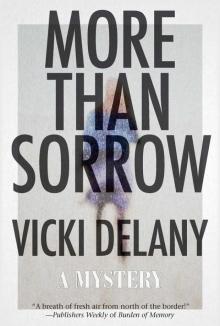 More Than Sorrow
More Than Sorrow In the Shadow of the Glacier
In the Shadow of the Glacier Gold Digger: A Klondike Mystery
Gold Digger: A Klondike Mystery Gold Web
Gold Web Haitian Graves
Haitian Graves Valley of the Lost
Valley of the Lost We Wish You a Murderous Christmas
We Wish You a Murderous Christmas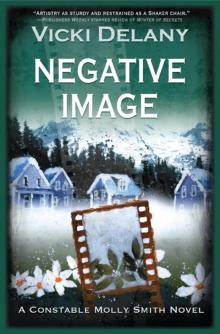 Negative Image
Negative Image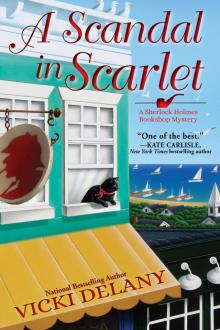 A Scandal in Scarlet
A Scandal in Scarlet Juba Good
Juba Good Winter of Secrets
Winter of Secrets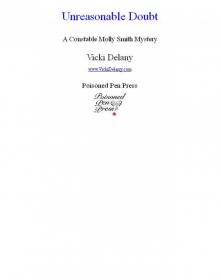 Unreasonable Doubt
Unreasonable Doubt Gold Fever
Gold Fever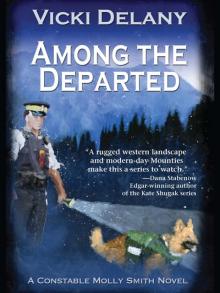 Among the Departed
Among the Departed Elementary, She Read: A Sherlock Holmes Bookshop Mystery
Elementary, She Read: A Sherlock Holmes Bookshop Mystery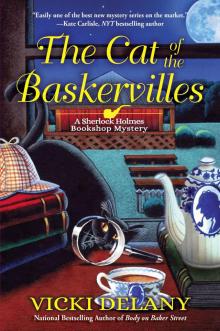 The Cat of the Baskervilles
The Cat of the Baskervilles